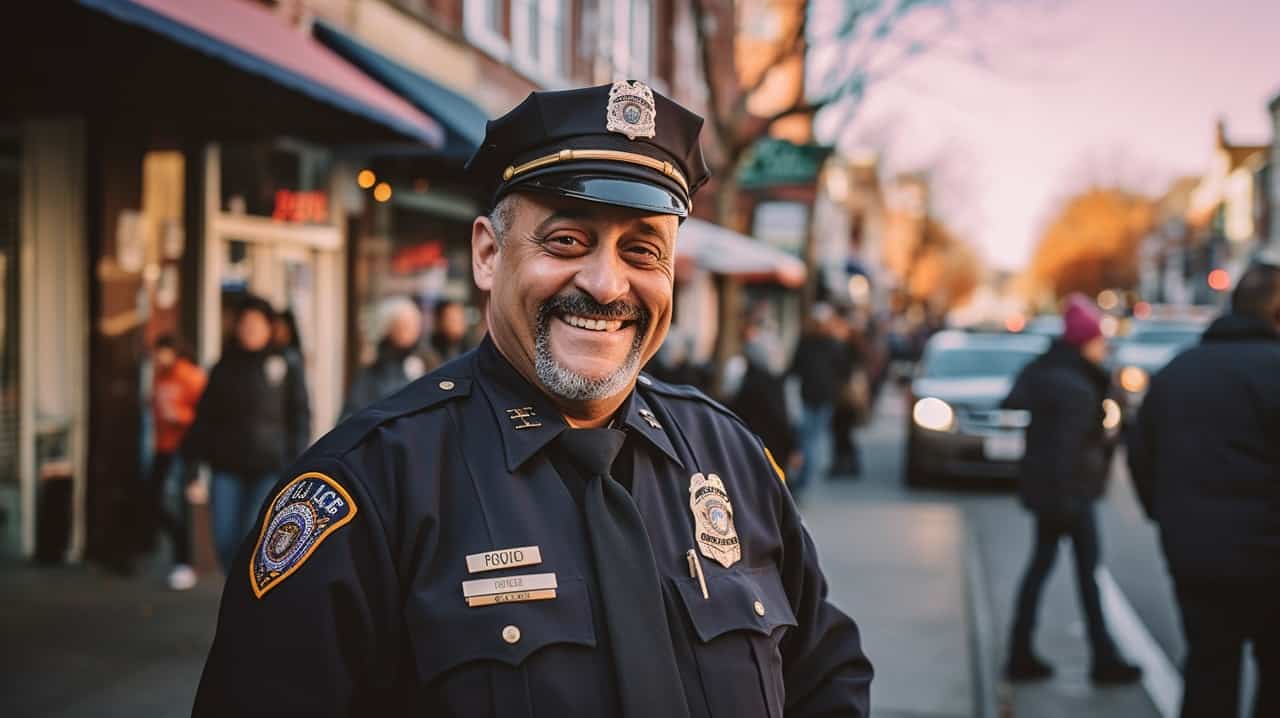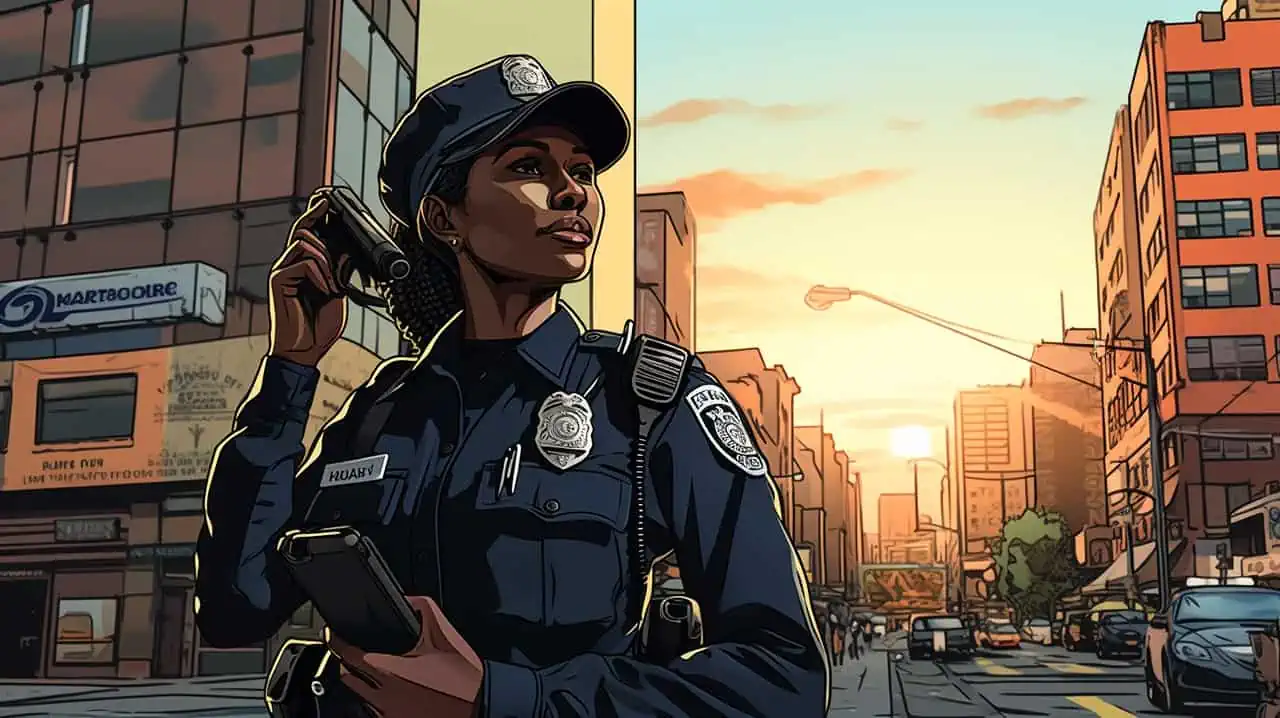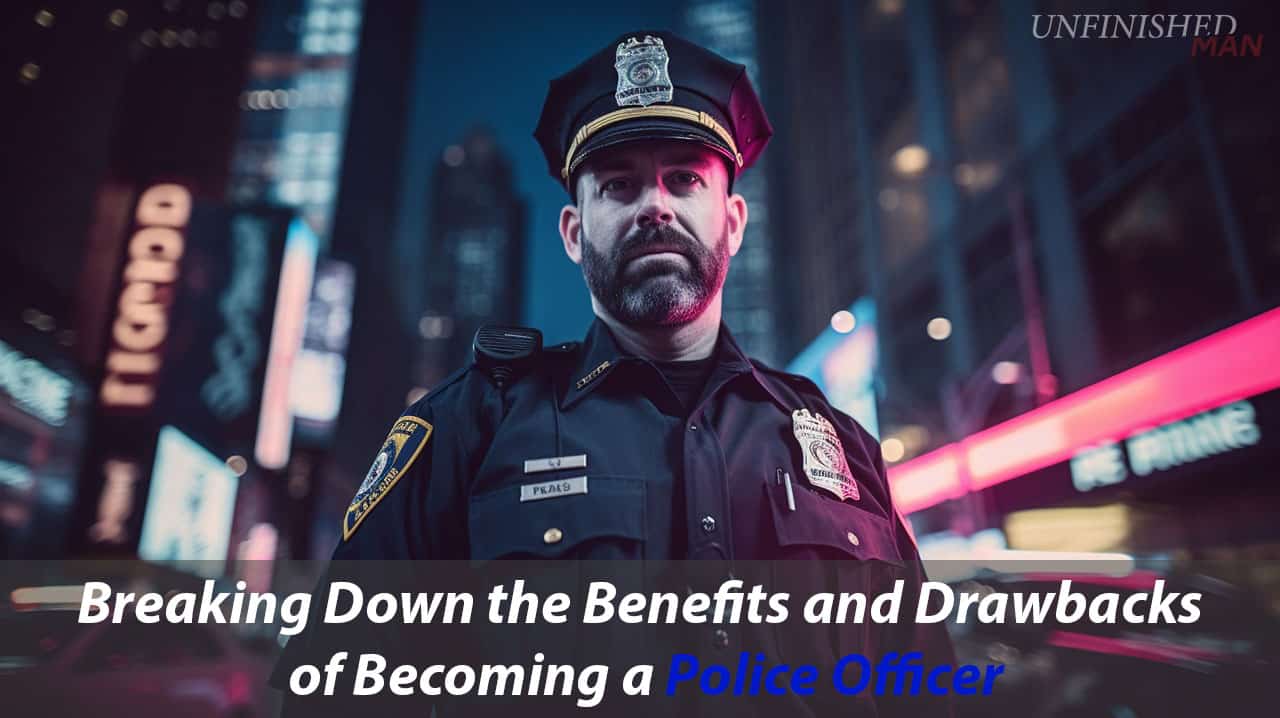Considering a career in law enforcement? It’s crucial to understand what you’re signing up for, as I have done extensive research on the realities of being a police officer. Police work is not all car chases and busting bad guys; it comes with both engaging benefits and daunting challenges.
In this insightful blog post, we’ll examine the pros and cons of being a police officer—equipping you to make an informed decision about whether this noble profession is right for you. Ready to unlock your future?
Key Takeaways
Being a police officer offers a high reputation in society, diverse job opportunities, competitive salary and benefits, the opportunity for advancement, a sense of purpose and community, job security, continuous training and specialization, physical fitness, and an active lifestyle, as well as the potential to positively impact the community.
Police officers play a crucial role in maintaining peace and order within their communities. The career provides a sense of purpose and belonging while creating tight-knit bonds with colleagues.
Job security is a significant advantage of being a police officer due to the constant need for human interaction and decision-making skills that cannot be replicated by technology. Additionally, continuous training enhances an officer’s skills while promoting personal and professional growth. Maintaining physical fitness is also crucial for success in this field.
Table of Contents
Understanding the Role of a Police Officer

As a police officer, the veil of societal decay is lifted, and you’re thrust onto the front lines to defend your community. Your job isn’t just about enforcing laws. It’s often much more profound, requiring an inner motivation to do good for others and improve society’s conditions.
You’ll deal with different kinds of people in various situations daily – this aspect of the role reinforces patience and imparts invaluable interpersonal skills.
Your day might start with paperwork but could end in pursuing a street racing suspect or calming a disturbing scene at someone’s home. The unpredictability keeps boredom at bay while keeping your mental faculties sharp as well as your physical fitness level high because most elements of law enforcement place great emphasis on maintaining one’s health and strength.
As part of an efficient agency like the Metropolitan Police Department, you’ll enjoy good future job prospects since humans can’t replace many aspects of policing with machines anytime soon.
Pros of Being a Police Officer

Being a police officer comes with a high reputation in society, diverse job opportunities, competitive salary and benefits, the opportunity for advancement, a sense of purpose and community, job security, continuous training and specialization, physical fitness, and an active lifestyle, as well as the potential to positively impact the community.
High Reputation in Society
As a police officer, you carry an undeniable sense of prestige and respect in society. The badge and uniform are symbols of honor, embodying trust and dependability. People look to you for safety, protection, and upholding the law – it’s not just any job; it’s a service to your community.
You’ll be seen as someone who has taken an oath to put others before themselves, which naturally commands immense reverence.
Moreover, this career can offer high standing within different circles – from local communities to national platforms. It gives officers the chance to showcase their commitment to safeguarding society while creating strong fraternal relationships built on mutual respect and understanding.
According to surveys, public sentiment generally tilts favorably towards police officers due primarily to their commendable roles in promoting peace and orderliness in our communities.
Diverse Job Opportunities
As a police officer, you’re stepping into a world of endless professional possibilities. The law enforcement field is abundant, with diverse job opportunities that extend far beyond routine patrol duties.
You could work as part of an elite SWAT team, serve in the canine unit working alongside specially trained dogs, or dive into detective work where sleuthing and problem-solving are at the forefront.
There’s even scope to specialize in fields like cybercrime or forensic science if technology or lab work appeal to you more. With each role opening up its own unique path for career advancement and skill development, policing offers you a dynamic employment landscape filled with future job prospects poised to satisfy your innate curiosity and challenge your competencies every step of the way.
Competitive Salary and Benefits
As a police officer, one of the major perks is the competitive salary and benefits package. Not only do you have the opportunity to earn a decent income based on your education and location, but you also receive a range of benefits that contribute to your overall financial well-being.
These benefits can include health insurance, retirement plans, paid leave, and even additional perks such as discounts or freebies due to the high reputation of police officers in society. So not only are you able to make a difference in your community through law enforcement, but you’re also rewarded with a stable income and valuable benefits that ensure your financial security.
The combination of job satisfaction and financial stability makes being a police officer an attractive career option for many men looking for purposeful work.
Opportunity for Advancement
As a police officer, one of the key advantages of this career is the opportunity for advancement. In my experience, there are numerous paths to climb within the field of law enforcement. Starting off as a patrol officer is just the beginning; ambitious individuals can work their way up through the ranks and open doors for further career growth.
With dedication and hard work, many officers have been able to reach positions such as detective, sergeant, lieutenant, or even higher ranks within their respective departments. The chance to advance not only offers increased responsibility but also presents new challenges and rewards along the way.
This upward mobility ensures that there is always room for personal and professional development in this dynamic field. So if you’re someone who seeks constant growth and wants to make a tangible impact on your community while progressing in your chosen career path, then consider becoming a police officer – it may just be the right fit for you.
Sense of Purpose and Community
Being a police officer provides a strong sense of purpose and belonging to a community. Knowing that your work directly impacts the safety and well-being of others can be incredibly rewarding.
Whether it’s preventing crime, assisting in emergencies, or providing support to those in need, police officers play a crucial role in maintaining peace and order. This sense of purpose is further enhanced by the tight-knit bond formed among colleagues.
Spending significant time together on duty creates a unique camaraderie and brotherhood within law enforcement agencies. These relationships provide invaluable support, both professionally and personally, making the journey through the challenges of policing more manageable.
Job Security
Job security is a significant advantage of being a police officer. As someone who has been in law enforcement for several years, I can confidently say that this profession offers stability and peace of mind when it comes to your career.
Unlike many jobs that are at risk of being replaced by machines, the role of a police officer requires human interaction and decision-making skills that cannot be replicated by technology. This means that the demand for skilled individuals in law enforcement will always be present, providing you with long-term job security.
Additionally, working as a police officer often comes with benefits such as retirement plans and healthcare coverage, further enhancing your sense of financial stability. Knowing that you have a stable job can give you peace of mind and allow you to focus on serving your community to the best of your abilities without constantly worrying about job insecurity or layoffs.
Continuous Training and Specialization
As a police officer, one of the great advantages is the opportunity for continuous training and specialization. Law enforcement agencies recognize the importance of keeping their officers up-to-date with the latest techniques and knowledge to effectively carry out their duties.
In fact, there are approximately 1,500 courses and videos available to address every training need in various areas such as conflict management, trauma response, and emergency situations.
This commitment to ongoing education not only enhances officers’ skills but also provides them with valuable insights into addressing evolving crime trends and challenges. With technology playing a significant role in law enforcement today, specialized training ensures that officers are equipped to handle complex situations involving evidence collection, body-worn camera usage, and more.
Continuous training offers officers opportunities for career growth by allowing them to pursue specialized positions within different departments or units, such as SWAT teams or K-9 units. It also allows them to stay updated on changes in policies or legal requirements that may affect their day-to-day work.
Moreover, this emphasis on training indicates that law enforcement agencies prioritize investing in their personnel’s development and success. This commitment improves performance levels across departments while providing officers with new skills they can use both professionally and personally.
Physical Fitness and Active Lifestyle
Maintaining a high level of physical fitness is crucial for anyone considering a career as a police officer. As law enforcement professionals, we need to be able to handle the physical demands of our job effectively and respond quickly to emergencies.
Staying active not only helps us stay in shape but also promotes mental well-being, allowing us to cope better with the stresses of the job. It’s important to prioritize our health through regular exercise and outdoor pursuits that keep our minds positive.
Additionally, competition within law enforcement pushes us to constantly strive for improvement, both physically and mentally. Overall, embracing an active lifestyle is essential for success as a police officer.
Potential to Positively Impact Community
Being a police officer provides an incredible opportunity to make a positive impact on the community. Every day, police officers work tirelessly to maintain law and order, protect innocent lives, and ensure the safety of their neighborhoods.
By enforcing the law and preventing criminal activities, they contribute to creating a secure environment where people can live without fear.
Police officers often find themselves in situations where they can directly help individuals who are in distress or facing dangerous circumstances. Whether it’s responding to emergency calls, providing assistance during accidents or natural disasters, or even mentoring young people in schools and community programs, police officers have numerous opportunities to be role models and make a lasting difference.
Not only do police officers have the power to enforce justice through arrests and investigations, but they also play key roles in educating communities about crime prevention strategies. They actively engage with citizens by organizing neighborhood watch programs, conducting workshops on personal safety measures, and collaborating with local businesses and organizations on initiatives aimed at creating safer environments for everyone.
Cons of Being a Police Officer

Being a police officer can come with cons, such as the risk of injury or death, exposure to traumatic events, and potential public criticism – but these challenges shouldn’t deter you from considering this rewarding career.
Discover all the pros and cons to make an informed decision about whether a career in policing is right for you.
Risk of Injury or Death
As a police officer, I understand that one of the most significant risks we face is the potential for injury or even death. Every day, we put ourselves in harm’s way to protect our communities and uphold the law.
The reality is that our job can be dangerous, with constant threats of violence and encounters with individuals who may pose a risk to our safety. According to important statistics, police officers face a higher risk of being shot at, stabbed, or assaulted compared to many other professions.
This inherent danger adds an extra layer of stress and responsibility to our already demanding work. However, despite these risks, many officers are motivated by their inner drive to do good and make a positive impact on society.
Stressful Work Environment
Working as a police officer entails operating in an inherently stressful work environment. The unpredictable nature of the job, where officers often face dangerous and challenging situations, can take a toll on their mental and emotional well-being.
Studies have shown that many police officers suffer from depression and other mental health issues due to the stress they experience on the job. Additionally, constant exposure to traumatic events and high-risk situations can have long-lasting effects on their psychological state.
The pressure to make split-second decisions, often involving the use of force, adds another layer of stress that officers must navigate daily. These factors contribute to a demanding work environment that requires a strong ability to cope with stress effectively while maintaining focus and professionalism at all times.
Exposure to Traumatic Events
As a police officer, exposure to traumatic events is an unfortunate reality of the job. We often find ourselves in high-stress situations, witnessing and dealing with some of society’s most distressing incidents.
Whether it’s responding to accidents, violent crimes, or other emergencies, we are regularly exposed to scenes that can leave lasting emotional scars. According to studies, police officers have higher rates of post-traumatic stress disorder (PTSD) compared to the general population due to these experiences.
The emotional toll can be immense and can have a profound impact on our personal lives and mental well-being.
In addition to the immediate psychological effects, being exposed to traumatic events also puts us at risk for long-term health issues such as depression and anxiety. Witnessing violence and tragedy on a regular basis takes its toll not only on our minds but also on our bodies.
It’s crucial for police departments to provide adequate support systems like counseling services and peer support programs so that officers can process their experiences effectively and maintain their overall well-being.
Despite these challenges, many police officers find ways to cope with the trauma they witness through strong bonds within the law enforcement community and seeking help when needed from professional counselors or therapists who understand the unique demands of our profession.
Potential Public Criticism
As a police officer, it’s important to be prepared for the potential public criticism that comes with the job. In recent years, trust and respect for law enforcement have diminished, leading to increased hostility from some individuals.
This can result in negative comments, protests, or even personal attacks on social media platforms. It’s crucial to understand that not everyone will appreciate or agree with your actions as a police officer.
Public scrutiny is a reality that all officers face due to the significant authority they hold and the impact their decisions have on people’s lives. Mistakes can lead to serious repercussions and criticism if perceived as unjust or unfair.
It is essential to remain professional in dealing with public backlash and engaging in open communication when possible.
Irregular and Long Work Hours
Working as a police officer often means dealing with irregular and long work hours, which can have a significant impact on personal life. The unpredictable nature of the job means that officers may be called in for duty at any time, including weekends, holidays, and even during their scheduled days off.
This makes it challenging to plan activities or spend quality time with loved ones. Additionally, many police officers work night shifts due to higher criminal activity during those hours. These irregular schedules can disrupt sleep patterns and lead to exhaustion over time.
Despite these challenges, dedication to the profession and a sense of duty keeps many men committed to serving their communities as police officers.
Potential Legal and Ethical Dilemmas
As a police officer, you’ll often face challenging legal and ethical dilemmas that require quick thinking and sound judgment. These situations can be complex and emotionally charged, requiring you to navigate the gray areas of the law while upholding your duty to protect and serve.
It’s crucial to understand that every decision you make as a police officer has consequences, both for yourself and for those involved. The pressure to make the right choice can be overwhelming at times, but with proper training and guidance, you’ll develop the skills needed to handle these difficult situations with integrity.
Corruption within law enforcement not only damages public trust but also puts officers’ lives at risk. Maintaining your moral compass is essential, as even one unethical act can tarnish your reputation irreparably.
Upholding justice means treating everyone fairly and equally under the law, regardless of their background or social status. It’s important to remember that no profession is immune from bad actors; however, it’s incumbent on each officer to stay true to their oath and uphold high standards of conduct.
Risk of Burnout and Mental Health Issues
Being a police officer can take a toll on your mental health and lead to burnout. High levels of stress, exposure to traumatic events, and long hours can all contribute to this risk. Many police officers experience depression, anxiety, and post-traumatic stress disorder (PTSD) as a result of their work experiences.
It’s important to remember that the emotional burden of the job can be enormous and impact not only your professional life but also your personal relationships and overall well-being. Taking care of your mental health is crucial in such a demanding profession.
It’s worth noting that job satisfaction among police officers is generally low due to frustration and unmet expectations. Furthermore, discrimination based on factors like race, gender, disability, age, or religion is a potential risk in this profession.
Corruption is also an issue that some police officers may have to deal with while trying to uphold their duty. Additionally, the physical risks associated with being a police officer should not be underestimated; officers often face the danger of injury or even death as they confront challenging situations daily.
High Emotional Burden
Being a police officer comes with a high emotional burden that can take its toll on your well-being. Witnessing and dealing with difficult and traumatic situations is part of the job, and this can have long-lasting effects on your mental health.
Many police officers suffer from depression due to the nature of their work, which includes facing danger regularly and making tough decisions that have serious consequences. The emotional strain can also affect personal relationships, as the stress of the job often follows them home.
It’s important to understand that being a police officer requires resilience and coping skills to navigate these challenges effectively.
Potential for Work-Life Imbalance
Maintaining a healthy work-life balance can be challenging for police officers due to the irregular and unpredictable nature of their schedules. The demands of the job often require officers to work long hours, including nights, weekends, and holidays.
This inconsistency can impact personal relationships, making it difficult to plan and prioritize family time. Moreover, the physically demanding nature of policing leaves little room for self-care and relaxation outside of work.
The constant worry about safety also adds an additional layer of stress that is unique to this profession. Finding ways to manage time effectively and prioritize self-care becomes essential for maintaining overall well-being in a career as a police officer.
Balancing the Pros and Cons: Is a Career in Policing Right for You?

After weighing the pros and cons, you may be wondering if a career in policing is the right fit for you. It’s important to consider your personal strengths, values, and goals before making this decision.
On one hand, being a police officer offers job security and good future prospects. With the opportunity to make a positive impact on society and improve circumstances, it can provide a deep sense of purpose.
Additionally, the job requires a high fitness level which allows you to maintain an active lifestyle.
However, it’s crucial to acknowledge that being a police officer comes with its challenges. The high-stress environment, coupled with exposure to traumatic events, can take a toll on your mental health.
Long, irregular shifts and constant danger can lead to burnout as well. Furthermore, public hostility towards law enforcement has increased in recent years, which means facing potential criticism from those you are trying to protect.
Ultimately, whether or not a career in policing is right for you depends on your individual preferences and priorities. If you have strong coping skills, inner motivation to do good despite obstacles, and are willing to accept both the rewards and difficulties that come with the job, then pursuing this path could be fulfilling for you.
Frequently Asked Questions About the Pros and Cons of Being a Police Officer
What are the pros of being a police officer?
What are the cons of being a police officer?
How can I determine if a career in policing is right for me?
Are there any prerequisites or qualifications required for becoming a police officer?
Conclusion
In conclusion, a career in policing comes with both pros and cons. While being a police officer offers a high reputation, job security, competitive salary, and the opportunity to positively impact communities, it also entails risks of injury or death, stressful work environments, exposure to traumatic events, and potential legal dilemmas.
Ultimately, whether a career in policing is right for you depends on your personal values, strengths, and willingness to overcome challenges inherent to the profession.

